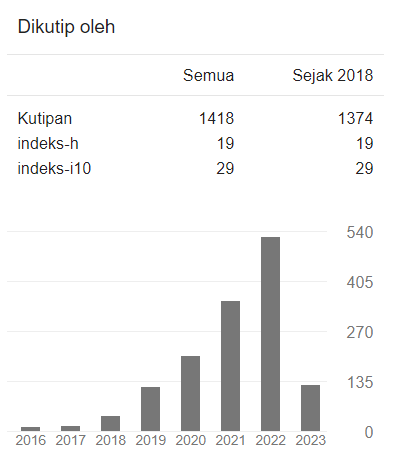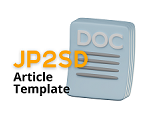Pengembangan Modul Pembelajaran Berbasis Kearifan Lokal pada Mata Kuliah Keterampilan Menulis dan Membaca SD
DOI:
https://doi.org/10.22219/jp2sd.v11i2.25427Keywords:
Pengembangan, Modul Pembelajaran, Keterampilan, membaca, MenulisAbstract
The learning module was developed because there was no teaching material in the form of a module based on local wisdom developed by the course lecturer. Therefore, through this research, it is expected to develop a learning module based on local wisdom. This research aims to develop a learning module suitable for use in teaching and to assess students' responses to the development of the learning module. They provide varied teaching materials to facilitate students' teaching and learning processes. This module was developed as a product through the Research and Development (RnD) method with the development process using the 4-D model (Define, Design, Develop, and Disseminate stages). Data collection instruments consist of validation sheets and questionnaires. The validation sheet is used to assess the validity of the product. The questionnaires are used to assess students' responses to the development of the interactive module. This research showed the feasibility of the research results in terms of validation by subject matter experts and language experts. The validation results of the material expert reached 88.57%, with a very feasible category. Meanwhile, the language expert validation results reached 93.33%, with a very feasible category. The survey results on students' interest in using the module reached 92.67%, with a very interested category. Based on the results, the learning module developed for elementary school reading and writing skills is highly suitable and attractive for teaching and learning.
Downloads
References
Deviana, T. (2018). Analisis Kebutuhan Pengembangan Modul Pembelajaran Berbasis Kearifan Lokal Kabupaten Tulungagung Untuk Kelas V Sd Tema Bangga Sebagai Bangsa Indonesia.
Dwi Yasa, A., Delawanti Chrisyarani, D., Akbar, dun, Mudiono, A., Guru Sekolah Dasar, P., & Kanjuruhan Malang, U. (2018). Keefektifan Modul Komik Tematik Berbasis Multiple Intelegence (MI) Untuk Siswa Kelas V SD.
Eko Rusminto, N. (t.t.). Module Development Based on Local Wisdom Using Contextual Teaching and Learning Models to Improve Learning Outcomes for Fourth Grade Elementary School Students. https://doi.org/10.33258/birci.v6i1.7482
Eliyanti, E., Taufina, T., & Hakim, R. (2020). Pengembangan Bahan Ajar Keterampilan Menulis Narasi dengan Menggunakan Mind Mapping dalam Pembelajaran Tematik di Sekolah Dasar. Jurnal Basicedu, 4(4), 838–849. https://doi.org/10.31004/basicedu.v4i4.439
Fajri, D. R., & Saputri, S. W. (2021). Development Of English Learning Model Based On Local Wisdom With Blended Learning Approach Using Macromedia Flash At Smpn Satu Atap Tunda Island. JOLLT Journal of Languages and Language Teaching, 9(4), 422. https://doi.org/10.33394/jollt.v%vi%i.4098
Hasibin, N., & Inayah, A. (2021). Developing English Textbook In Elementary School Based On Local Wisdom Of Banyuwangi (Vol. 8, Nomor 1).
Jantung Amelia, D. (2018). Pengembangan Bahan Ajar Cetak Dalam Bentuk Komik Untuk Siswa Kelas III Sekolah Dasar.
Kumalasani, M. P., & Eilmelda, Y. (2022). Analisis Efektivitas Penggunaan E-Modul Berbasis Aplikasi Flipbook Pada Pembelajaran Tematik Di SD. Jurnal Pemikiran dan Pengembangan Sekolah Dasar), 10(1), 39–51. https://doi.org/10.22219/jp2sd
Mulyatiningsih, E. (2013). Metode Penelitian Terapan Bidang Pendidikan. Alfabeta.
Murti, S., & Lazuardi, D. R. (2019). Pengembangan Bahan Ajar Mata Kuliah Konsep Dasar Bahasa dan Sastra Indonesia Berbasis Kontekstual STKIP PGRI Lubuklinggau. Jurnal Kajian Bahasa, Sastra dan Pengajaran (KIBASP), 3(1), 1–16. https://doi.org/10.31539/kibasp.v3i1.972
Nizaar, M., Haifaturrahmah, H., Abdillah, A., Sari, N., & Sirajuddin, S. (2021). Pengembangan Modul Tematik Berbasis Model Direct Intruction dalam Meningkatkan Hasil Belajar Siswa di Sekolah Dasar. Jurnal Basicedu, 5(6), 6150–6157. https://doi.org/10.31004/basicedu.v5i6.1792
Nofrianni, E. (2019). Pengembangan Bahan Ajar Membaca Pemahaman Menggunakan Model Somatic Auditory Visual And Intellectual Kelas IV SD. Dalam Jurnal Pemikiran dan Pengembangan Sekolah Dasar (Vol. 7, Nomor 1). http://ejournal.umm.ac.id/index.php/jp2sd
Pamenang, F. D. N. (2021). Local Wisdom In Learning As An Effort To Increase Cultural Knowledge: Students. Perception As Prospective Teachers. IJIET (International Journal of Indonesian Education and Teaching), 5(1), 93–101. https://doi.org/10.24071/ijiet.v5i1.3050
Pengembangan E-Modul Bangun Datar Berbasis Teori Multiple Intelligence Untuk Siswa Kelas IV SDN Ngupasan Kusuma Ardi Wijaya a1 , Mujiyem Sapti b2 , Rintis Rizkia Pangestika c3. (2022). https://doi.org/10.22219/jp2sd
Rahma Febriani, E., Alimah, S., Utara, L., & Kulon, K. (2020). Local Wisdom Learning Approach Towards Students Learning Outcomes. Journal of Primary Education, 9(2), 197–205. https://doi.org/10.15294/jpe.v9i2.31352
Riduwan. (2013). Skala Pengukuran Variabel-Variabel Penelitian. Alfabeta.
Sani, D. M., Sukarmin, & Suharno. (2021). The needs analysis for the development of electronic learning module (e-module) based on local wisdom information search in senior high schools’ physics online learning during COVID-19 pandemic. IOP Conference Series: Earth and Environmental Science, 1796(1). https://doi.org/10.1088/1742-6596/1796/1/012020
Subekti, T. (2018). Pengembangan Modul Bahasa Indonesia Bermuatan Nilai Karakter Kebangsaan Bagi Mahasiswa Pgsd. Profesi Pendidikan Dasar, 3(2), 88. https://doi.org/10.23917/ppd.v3i2.2746
Suryanti, S., Mariana, N., Yermiandhoko, Y., & Widodo, W. (2020). Local wisdom-based teaching material for enhancing primary students’ scientific literacy skill. Jurnal Prima Edukasia, 8(1), 96–105. https://doi.org/10.21831/jpe.v8i1.32898
Zahroul Fitriyah, C., & Putri Wardani, R. (2022). Analisis Kebutuhan Pengembangan LKPD Berbasis Kearifan Lokal Daerah Banyuwangi di Sekolah Dasar. Jurnal Pemikiran dan Pengembangan Sekolah Dasar (JP2SD), 10(1), 62–73. https://doi.org/10.22219/jp2sd.v10i1.20396
Downloads
Published
Issue
Section
License
Copyright (c) 2023 Mety Toding Bua, Ady Saputra

This work is licensed under a Creative Commons Attribution-ShareAlike 4.0 International License.
Authors who publish with Jurnal Pemikiran dan Pengembangan Sekolah Dasar (JP2SD) agree to the following terms:
- For all articles published in Jurnal Pemikiran dan Pengembangan Sekolah Dasar (JP2SD), copyright is retained by the authors. Authors give permission to the publisher to announce the work with conditions. When the manuscript is accepted for publication, the authors agree to automatic transfer of the publishing right to the publisher.
- Authors retain copyright and grant the journal right of first publication with the work simultaneously licensed under a Creative Commons Attribution-ShareAlike 4.0 International License that allows others to share the work with an acknowledgment of the work's authorship and initial publication in this journal.
- Authors are able to enter into separate, additional contractual arrangements for the non-exclusive distribution of the journal's published version of the work (e.g., post it to an institutional repository or publish it in a book), with an acknowledgment of its initial publication in this journal.
- Authors are permitted and encouraged to post their work online (e.g., in institutional repositories or on their website) prior to and during the submission process, as it can lead to productive exchanges, as well as earlier and greater citation of published work (See The Effect of Open Access).

This work is licensed under a Creative Commons Attribution-ShareAlike 4.0 International License.


















